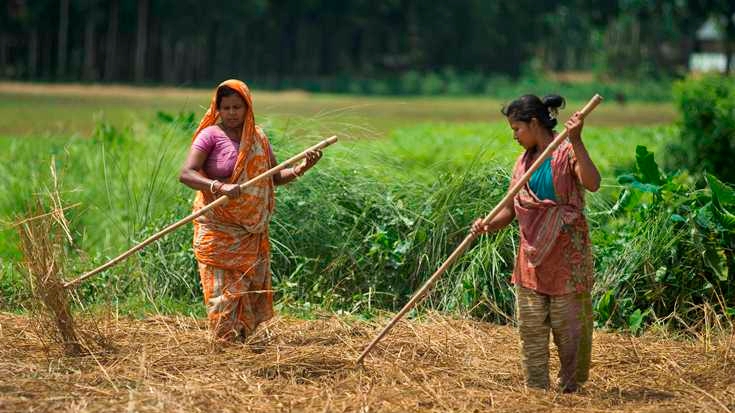Modern livestock farming is playing a vital role in enhancing food security, generating self-employment, and reducing poverty in the Rajshahi region, particularly across the vast Barind tract.
To strengthen the sector’s impact, the Department of Livestock Services (DLS) has implemented various initiatives, including the modernisation of farming practices, promotion of high-yield livestock breeds, training programmes for farmers, and improved access to quality animal-source foods.
According to department sources, infrastructure at public goat farms has been upgraded, and new demonstration farms are being established to train farmers and build skilled manpower. These farms distribute quality goats and provide hands-on training, awareness campaigns, and technical support.
In recent years, household-based sheep and lamb farming has shown remarkable growth, empowering marginalised groups and stimulating the rural economy, particularly in remote areas of Barind.
Lamb farming is emerging as a sustainable income source for both commercial and small-scale rural households.
Many local families are adopting modern livestock management practices, overcoming traditional barriers such as lack of infrastructure and technical knowledge.
Sheuly Begum, 52, of Godagari upazila, started sheep farming three years ago with just five sheep. Today, she owns eight healthy sheep.
“This initiative changed my life. It gave me financial stability and hope for the future,” she said.
Similarly, Moni Begum, 43, from Paba upazila, began her venture in April 2024 with five sheep and now owns nine. Her success is attributed to scientific care and strong community-level support.
In Bagmara upazila, a graduate couple — Sohel Rana and Rima Khatun — turned to goat farming after struggling to find government jobs.
“We invested around Tk2 lakh in 40 goat kids this year and sold 20 of them during Eid for Tk4.5 lakh,” said Sohel. “We expect even better returns in the future.”
The Sheep Development Farm in Rajabarihat, Godagari upazila, is also playing a key role in ensuring the supply of safe and adequate animal protein. The facility focuses on improving animal productivity, veterinary services, and value addition.
Saidur Rahman, 48, a retired army man from Champakuri, Bagmara, is now a successful duck farmer, earning approximately Tk1.20 lakh per month.
Starting with 35 chicks from the Santahar Duck Breeding Center, he now manages around 1,000 ducks, producing about 900 eggs daily.
“The Upazila Livestock Office provides vaccines and technical support, which has helped me grow this business,” he said.
Dr Atibur Rahman, Upazila Livestock Officer, praised Saidur’s achievements: “He is an intelligent, hard-working farmer who has opened a new horizon for duck farming in this region.”
Monwara Khatun, 43, from Pirijpur village, Godagari, combined duck rearing with running a grocery shop to lift her family out of poverty.
“Duck farming is simple, affordable, and highly profitable,” she said.
Meanwhile, Mabiya Khatun, 45, from Halidagachhi village, Charghat, shared her success in cattle fattening. She grows her own fodder, maintains hygienic conditions, and has seen growing interest from neighbours. “Many villagers are now switching to modern cattle fattening methods to meet market demand,” she noted.
Her neighbour Abdus Sattar, 53, echoed her success with four bulls. In total, at least 43 families in the locality are now engaged in commercial cattle fattening, reflecting a broader shift from traditional to modern livestock practices.
With sustained government support and increasing farmer participation, modern livestock farming is poised to play an even greater role in rural development, food security, and poverty eradication across the Rajshahi region.
Source - https://www.daily-sun.com













